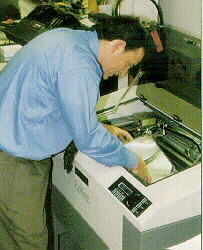|

LASER CUTTING OF ACRYLIC OPTICS
Lasers continue to find unique application in various industrial segments as efficient and cost effective tools. An example of a unique application is at Fresnel Optics, a Reflexite Company, located in Rochester, New York. Fresnel designs and produces optical, plastic microstructured lenses for non-imaging applications. Their products include a variety of circular and linear lenses, prisms, lenticulars, corner cubes and other microstructured optical components. The most common application of their lens is in overhead projectors, located directly below the glass plate where a transparency is placed.
High quality lenses have traditionally been manufactured through a compression molding process. As such, they are made oversized and trimmed to final size through a secondary operation. In 1998, due to price pressure from the market, Fresnel sought ways to become more efficient in their secondary operations - the trimming and finishing aspect of their lens production. The typical process for these secondary operations included trimming the lenses using a high speed router, which produced reliable and repeatable sizing and edge finish; however, the long cycle time and yields for these processes were considered inefficient. A variety of secondary operations, including lasers, was investigated. What they found was a laser system manufactured by Epilog Corporation, with a few modifications, could significantly reduce their secondary operation cycle times and increase their process yields.
The RADIUS laser system has a fixed-bed, flying optics system available from 10 to 100 watts. Because the overhead projector lenses are flat and relatively small, they are well suited for the 24-inches x 18-inch cutting area of the laser. After much testing Fresnel chose the 100-watt system because of its accuracy, repeatability of continuous cutting, cleanliness of operation and cycle time.
By incorporating the laser into their production process, they were able to optimize the efficiency of their secondary operations With the old process of trimming, material was machined creating fine plastic chips. The very fine chips became an airborne contaminant and thus the machining process could never be in close proximity with the "clean room environment" of the molding operation. Therefore, the lenses would be molded in one area and trimmed in another. In addition, the lenses would need to be cleaned in order to remove any residue chips. The laser provided a solution for eliminating chips from the process, and enabled Fresnel to 'cellularize' the lens manufacturing process. Because of this, one operator could mold, trim, inspect, and package the lenses in one, efficient operation.

Because Fresnel manufactures high-quality optics, it was vitally important that any secondary operations not alter or damage the microstructures in the lenses. As with all lasered material, vapor is generated which, is exhausted out of the system, usually through vents in the back of the laser. As the plastic vapors exited, a plastic vapor stain was being left on the surface of the lenses. To alleviate this, Chris Frank, Fresnel's Mfg. Eng. Mgr., designed a custom system to eliminate any potential of plastic vapor staining of the optics. The design, code-named S.A.M. for Smoke & Air Manipulator, was incorporated into the existing RADIUS laser head and acts as a multidirectional air assist tool to move the plastic vapor outward toward the scrap part of the lens, leaving the finished optic free of vapor stains. By custom modifying the Epilog 100 Watt laser, Fresnel has been able to create an optics manufacturing process that can produce high quality optical components with significantly higher yields and lower costs.
For more information, contact Christopher J. Frank, Fresnel Optic, 1300 Mt. Read Blvd., Rochester, NY 14606, 716-647-1140, e-mail chris.frank@reflexite.com OR Bob Henry, Epilog Corporation, 500 Corporate Circle, Suite L, Golden, CO 80401, 303-277-1188, e-mail: bobh@epiloglaser.com.
|